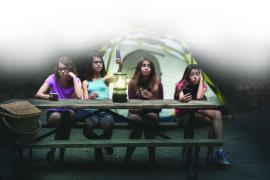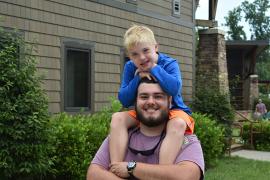Camp may just be one of the most social places on Earth — with its singalongs, family-style dining, hikes, color wars, and an abundance of other group activities day in and day out for an entire summer session. Such opportunities to socialize have long been touted for their positive influence when it comes to campers’ mental, emotional, and social health. But is there such a thing as too much togetherness for some campers?
If a child is an introvert, the answer may be a quiet but emphatic, “Yes.” And since camps are in the business of helping kids discover and grow their strengths so they can go out in the world and thrive, you should be aware of your introverted campers, common misconceptions about them, and the best ways to emotionally enable and support them.
What Is an Introvert?
“According to the American Psychological Association, introverts tend toward their inner self, thoughts, and feelings. They are typically more withdrawn, reserved, and quiet, and they usually prefer to work alone” (Coelho, 2020).
Medical News Today reports that an individual is likely to be an introvert if they (Coelho, 2020):
- Are quiet or reflective
- Prefer to befriend one or two people and know them well
- Enjoy being alone and favor individual tasks and activities
- Often spend time thinking and are slow to action
But introversion is not an all-or-nothing proposition. It exists on a spectrum, which, “like many continuous dimensions within psychology, represents a way in which we can classify something in terms of its position on a scale between two extreme points. In this case an individual’s innate tendency to respond to stimuli in a certain fashion” (Houston, 2019).
In reality, most of us exhibit qualities of both introversion and extroversion and fall somewhere between the two, says Positive Psychology writer Elaine Houston (2019).
Those individuals who do tend more toward the introvert end of the scale often must combat misjudgments about who they are.
Common Misconceptions
Introversion Is Uncommon
Introverts are not rare. According to Forbes writer Jenna Goudreau, “Studies show that introverts are one-third to half of the US population” (2012), so you will host introverted campers in your bunks and in your day camp programs.
Introverts Are Unfriendly
Introverts’ quiet nature can lead to the erroneous belief that all introverts are stuck-up or rude. More likely, they are just misunderstood.
Goudreau, says, “We live in a culture that is biased against introverts. Instead of embracing their serious, often quiet and reflective style, they are encouraged to act like extroverts — those assertive, outgoing types that love teamwork, brainstorming, networking, and thinking out loud” (2012).
The following words have all been used to define or describe introverts:
- Aloof
- Antisocial
- Awkward
- Backward
- Bashful
- Coy
- Demure
- Diffident
- Embarrassed
- Inhibited
- Lone
- Lone-wolf
- Modest
- Recessive
- Reserved
- Retiring
- Self-conscious
- Self-effacing
- Sheepish
- Shy
- Snobby
- Standoffish
- Unadventurous
- Unassertive
- Uneasy
- Unenterprising
- Unsociable
- Unsocial
- Uptight
- Withdrawn
That’s a mouthful of mostly unflattering descriptors. Such negative stigma can lead to harmful self-perception among introverts that can follow them through life if they aren’t taught anything to counterbalance these assumptions, as reflected in this childhood reminiscence from author Marti Olsen Laney, PsyD (2005).
Like most introverted children, I was very much in tune with my own internal rhythms but often fatigued and overwhelmed by interacting with the larger social world. The way I experienced the world led me to several conclusions about myself. Because I was tentative about joining in games, I concluded that I was an oddball. Because, even when I knew the material, I couldn’t trust myself to retrieve answers on the spot, I concluded that something was wrong with my memory or that I was not very smart. Because I was so quiet around others, I concluded that I had little to offer.
Susan Cain, author of Quiet: The Power of Introverts in a World That Can’t Stop Talking, concludes that this bias toward introversion can lead to a “colossal waste of talent, energy, and happiness” (2012b).
We Can Make Them More Outgoing
While we all change and grow throughout our lives, introversion and extroversion are genetic. The wiring in an introvert’s brain is different from that of an extrovert, and an introvert reacts differently to the neurotransmitter dopamine, “a chemical released in the brain that provides the motivation to seek external rewards like earning money, climbing the social ladder, attracting a mate, or getting selected for a high-profile project at work” (Granneman, 2016). When dopamine is released in the body in response to social interactions, it elicits a feeling of satisfaction in extroverts, while an introvert often experiences overstimulation instead (Golimbet et al., 2007).
According to Christine Fonseca, author of Quiet Kids: Help Your Introverted Child Succeed in an Extroverted World (2021), introverts favor use of a different neurotransmitter called acetylcholine. Also linked to pleasure, acetylcholine “makes us feel good when we turn inward. It powers our abilities to think deeply, reflect, and focus intensely on just one thing for a long period of time. It also helps explain why introverts like calm environments — it’s easier to turn inward when we’re not attending to external stimuli” (Granneman, 2016).
How Can You Help Your Introverted Campers?
A Little Quiet Can Go a Long Way
Camp can feel like one giant social event, and so much stimulation can easily drain an introvert of energy. Granneman calls that loss of energy “the introvert hangover” (2017). Watch for signs of fatigue in your quieter campers. While older and returning campers may recognize when this is happening to them, your younger campers may be less aware. Consider providing a quiet place or room somewhere in camp to allow introverts (or any of your campers who need a break) to relax and recharge away from other campers.
Be aware that your more introverted campers may take a while to warm up to new people and places. Let an uneasy camper stand back from the action at a comfortable distance — perhaps near a counselor, where they feel a little safer — and simply watch for a bit. Quiet observation can help them process their surroundings. As camp progresses, it might also be a good idea to prepare a camper who you know is an introvert for something new that’s coming up. You can discuss what the event is, how the child might feel, and what they can do if they feel their energy beginning to take a nosedive.
Understand They May Not Do Small Talk
An introvert in unfamiliar surroundings or large groups may have an aversion to small talk, and to someone who doesn’t understand introverts, this can be taken as rude. For example, say you walk up to a camper and put up your hand for a high-five and ask, “How are you doing? Are you enjoying camp?” And you get a shrug or a quick half-smile in return and not much else. Your first impulse may indeed be to think, “Geez, that was a little rude,” but know that it probably isn’t intentional. Introverts often prefer to listen and observe rather than voice their thoughts or opinions right away. That doesn’t mean they aren’t asking the same questions all the other kids are. They’re just doing it in their heads. This is a good point to make with camp counselors and other seasonal staff, so they’re not inadvertently calling out the quieter campers in their group. If your counselors are aware of a camper’s introversion, they may, in fact, be in a position to gently guide that child in interactions with other campers and new situations. It could mean the difference between a camper having a fantastic summer and one who won’t return to camp.
Help Them Find Their Voice
Introverted campers may sense others’ judgments, or misjudgments, of their behavior and lack the confidence to step out of their comfort zones. Over time, you can help them self-regulate those negative feelings by pointing out positive outcomes that have come from them taking calculated risks in the safe environment of camp. For example, “I saw that you helped write a new verse for your bunk group’s song in the talent show. You have great creativity, and you ended up having fun on stage.”
Because they are prone to being misunderstood, introverted children are also vulnerable to bullying and may struggle to stand up for themselves or internalize problems and refuse to ask for help. Take, for instance, a nine-year-old introvert who said nothing even after days of a group of peer girls thinking it was funny to take turns kicking her each morning. Fonseca says that we have to teach young introverts that “their voice is important.” You can encourage your quiet campers to practice voicing just one word, such as “No!” or “Stop!” At the very least, this will be an immediate indicator to a nearby counselor that something is afoot.
The Upside
They Are Loyal Friends
Introverts may do poorly connecting to tons of people, but your quiet campers are capable of great connection to those they consider close friends. In fact, they tend to be extremely loyal. Introverts often process relationships mentally and emotionally. When they find a loyal friend, they treasure the relationship as a precious gift.
Observational Skills
According to Jennifer Kahnweiler, PhD, author of The Introverted Leader: Building on Your Quiet Strength, introverts take more time to process information than extroverts because they actually “process more thoughtfully than extroverts do — they take extra time to understand ideas before moving on to new ones” (2018).
That means your more introspective campers could bring a unique perspective to activities the rest of us just take for granted. Science journalist Winifred Gallagher said, “The glory of the disposition that stops to consider stimuli rather than rushing to engage with them is its long association with intellectual and artistic achievement. Neither E=mc2 nor [the classic novel] Paradise Lost was dashed off by a party animal” (Cain, 2012a).
Cain says we shouldn’t just accept introverts for who they are; we should cherish them for who they are. “Introverted children are often kind, thoughtful, focused, and very interesting company, as long as they are in a setting that works for them” (2012b). And with your help, camp can be one of those settings.
Books of Interest
- Quiet: The Power of Introverts in a World That Can’t Stop Talking by Susan Cain
- Quiet Kids: Help Your Introverted Child Succeed in an Extroverted World by Christine Fonseca
- The Secret Lives of Introverts by Jenn Granneman
- The Introverted Leader: Building on Your Quiet Strength by Jennifer Kahnweiler, PhD, CSP
- The Hidden Gifts of the Introverted Child by Marti Olsen Laney, PsyD
Marcia Ellett, MPW, is the editor in chief of Camping Magazine.
References
- Cain, S. (2012a, March 18). Introverts run the world — quietly. CNN. edition.cnn.com/2012/03/18/opinion/cain-introverts-power/index.html
- Cain, S. (2012b). Quiet: The power of introverts in a world that can’t stop talking. New York, NY: Crown Publishing Group.
- Coelho, S. (2020, June 9). Everything you need to know about introversion. Medical News Today. medicalnewstoday.com/articles/introvert-definition#am-i-an-introvert
- Fonseca, C. (2013). Quiet kids: Help your introverted child succeed in an extroverted world. New York, NY: Routledge.
- Golimbet, V. E., Alfimova, M. V., Gritsenko, I. K., & Ebstein R. P. (2007). Relationship between dopamine system genes and extraversion and novelty seeking. Neuroscience and Behavioral Physiology, 37, 601–606. doi.org/10.1007/s11055-007-0058-8
- Goudreau, J. (2012). So begins a quiet revolution of the 50 percent. Forbes. forbes.com/sites/jennagoudreau/2012/01/30/quiet-revolution-of-the-50-percent-introverts-susan-cain/?sh=e5183d393fb5
- Granneman, J. (2016). The scientific reasons why introverts and extroverts are different. HuffPost. huffpost.com/entry/the-scientific-reasons-why-introverts-and-extroverts-are-different_n_566eedf6e4b011b83a6be33a
- Granneman, J. (2017). The secret lives of introverts: Inside our hidden world. New York, NY: Skyhorse Publishing.
- Houston, E. (2019, April 9). Introvert vs extrovert: A look at the spectrum and psychology. PositivePsychology.com. positivepsychology.com/introversion-extroversion-spectrum/
- Kahnweiler, J. B. (2018). The introverted leader: Building on your quiet strength. Oakland, CA: Berrett-Koehler Publishers.
- Laney, M. O. (2005). The hidden gifts of the introverted child. New York, NY: Workman Publishing Company.





